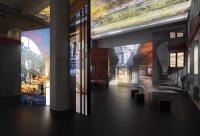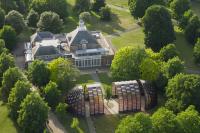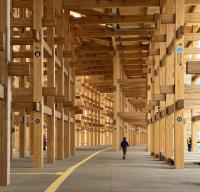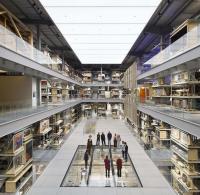Taihu Lake Resort Phoenix Terrace Remodeling
Suzhou, China
Site situation
The Phoenix Terrace is located on Changsha Island in the center of Taihu Lake, Suzhou. It is situated at the southern end of Bridge No. 1 of the Taihu Bridge and serves as the connecting island between Bridge No. 1 and Bridge No. 2, making it a necessary passage to Xishan. Changsha Island is one of the islands in the east and west of Taihu Lake. The island is surrounded by the lake on all sides and resembles a phoenix from above, which is how Phoenix Terrace got its name.
Originally a scenic spot, Phoenix Terrace covers an area of eight acres and features a compact yet intricate design. The garden includes various attractions such as Yuebo Bridge, Misty Rain Pavilion, Shuofan Tower, Fengqi Pavilion, and Small Stone Mountain House. However, it is currently in a state of disrepair. The old concrete roof and beams are only partially damaged, with the overall structure remaining relatively intact.
Situated on the picturesque shores of Taihu Lake, this site offers not only an excellent vantage point for viewing the scenery but also holds rich cultural and historical significance. From Phoenix Terrace, visitors can enjoy sweeping views of the lake's natural beauty and experience the harmonious blend of nature and history.
Design concept
We tread in the footsteps of the past, connecting beauty, faith, and art, transforming the architectural space of the past into a modern form that will never change or be destroyed. Ruins serve as markers, remnants, and imprints; they speak of foundations and truths. They are beacons, fundamental points guiding our design and choices.
The core concept of this renovation project is the "juxtaposition of history and future." The design team aims to breathe new life into this historic building through modern design techniques. They have chosen weathering steel and black steel as the primary materials. The natural rust effect of the weathering steel complements the rustic texture of the stone, creating a striking contrast and harmonious unity that preserves the building's historical feel while imparting a modern touch. This project will become a renowned and prestigious landmark around Taihu Lake and the Yangtze River Delta region. It aims to create a Taihu Resort Area that integrates cultural tourism, luxury clubs, cafes, and artistic and cultural creation.
Design strategy
When taking on this project, vegetation had already taken over the entire structure, growing between the cracks in the stone. In terms of spatial design, the architects chose not to completely remove this "plant armor" that had developed over time. Instead, they decided to respect it, viewing it as "an integral part of the historical monument" that protected the building from collapse during its period of vacancy. The design process integrated the greenery and landscape elements surrounding the building, enhancing the harmony between the structure and its natural environment.
The original Chinese octagonal pavilions were removed and transformed into three spiraling towers, symbolizing the convergence and elevation of history and modernity. The spiral structures not only create a strong visual impact but also guide visitors upward, allowing them to experience changes and extensions in space. Additionally, the internal space layout was optimized, and the flow within the building was reimagined. This redesign ensures that the café is not just a place for relaxation but also a space for cultural exchange and experience.
In terms of business planning, the new Phoenix Terrace offers a diverse range of functions to meet the needs of different visitors. In addition to providing high-quality coffee and light meals, the café includes an art exhibition area, a cultural exchange zone, and a family activity area. The art exhibition area hosts regular exhibitions featuring works by local and international artists, enriching the cultural experience for visitors. The cultural exchange zone provides an interactive platform for visitors, offering various lectures and workshops to promote cultural exchange and dissemination. The outdoor family activity area offers a safe and comfortable space for families, enhancing the joy of parent-child interaction while enjoying the scenic beauty of Taihu Lake.
Additionally, the business meeting area provides a refined and quiet environment for professionals to conduct discussions. The exclusive club member activity space offers members a dedicated social venue for hosting various high-end events, enhancing the overall sophistication and class of the café.
In terms of materials, the permanence of weathered metal, once matured, seems to mimic and reflect the texture of the ancient stone exterior walls. Weathering steel is a special iron alloy that withstands corrosion and matures to match the texture of the historic walls. The contemporary architecture does not compete with the historical structure; instead, it creates a cohesive whole where all new and old elements progress in harmony.
Regarding the dialogue between the past and the present, I believe that the renovation of historical buildings is an embrace between the past and the modern, a promise never to betray each other. One transforms into the other, and nothing is erased. In designing Phoenix Terrace, I feel like an archaeologist, combining elements of the past, present, and future. I do not remove; instead, I suspend, bind, fix, and slide, staying true to the original ground and the initial work. Using weathered metal, I reveal the stone and the monument, sanctifying the ruins and their poetic state.





















